Get familiar with Reflect for Microsoft Teams
Reflect is designed to support teachers and students in building SEL skills. It's meant to be a space where students can reflect honestly and privately with you. It can serve as a kickoff for further SEL explorations and lessons, or as data to support your teaching practice.
Reflect is available in Microsoft Teams as a tab app in each class team, as a web app, as a desktop app available in the Windows Store, and integrated into LMS platforms. Educators can post regular emotional check-ins to their group of learners, creating opportunities for students to share their feelings and providing valuable insights into the classroom's emotional climate. Educators can better understand trends in student emotions over time with Reflect trends and Teams Insights.
Where do I find Reflect?
- Microsoft Teams: Available as a tab in every class team for easy check-ins. Learn more.
- Web app: Access Reflect through any browser for flexible use. Learn more.
- Desktop app: Download from the Windows Store for quick desktop access. Learn more.
- OneNote: Insert Reflect check-ins directly into Class Notebook pages. Learn more.
- LMS integration: Available in popular LMS platforms. Learn more.
Your students' privacy: Reflect offers options for both identified and anonymous check-ins. While you can allow students to see the distribution of emojis their peers experienced, only you see names associated with responses.
How does Reflect connect to social emotional learning competencies?
The Collaborative for Academic, Social, and Emotional Learning or CASEL, are leaders in research and drivers of policy surrounding social and emotional learning. They identified five broad and interrelated areas of SEL competency:
- Self-awareness
- Self-management
- Social awareness
- Relationship skills
- Responsible decision making
For each SEL competency area, there are connections to Reflect and how it can be mobilized to support students and classroom communities.
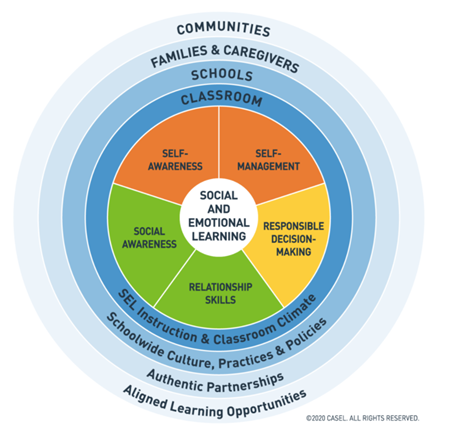
Self-awareness
Self-awareness is the most clearly linked to a check-in app like Reflect. Building the skills to identify one's emotions and examine one's mistakes is key to other SEL skills such as relationship building and responsible decision making.
All reflections can be leveraged to support student's self-awareness, but the simplest questions in Reflect get most directly to developing and understanding one's own range of emotions.
Responding to the simple question How are you feeling today? can help students build their emotional vocabulary. Having the words to clearly express your needs is vital to self-advocacy. The Feelings Monster in Reflect is designed to support students in connecting facial and body language cues to their emotions and the emotions they see around them every day.
Overall, how did you feel this week? With this question, educators that advised on the Reflect app suggest using the student's journal to help them get a sense of how emotions change and shift over time. This can help them build coping skills with the awareness that a "bad day" doesn't mean a bad week. This can be linked to "main idea" learning and even to fractions. "I had green emotions 3 out of 5 days this week," for example.
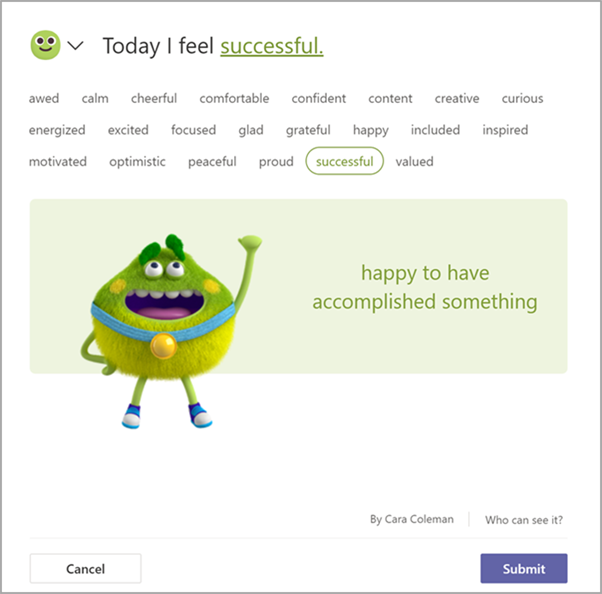
Self-management
Self-management is demonstrated through goal setting, using planning and organizational skills, and managing one's emotions. Reflect can support the development of self-management skills by helping educators to explicitly teach growth mindset. Growth mindset is defined as the belief that a person's capacities and talents can be improved over time. Through questions like How do you feel about your ability to succeed in this class? educators can get a sense of which students may need explicit support - both in the content and in having a growth mindset!
Feedback from students about their interpretation of their ability to succeed is also a valuable tool for growth-minded educators. If their class indicates they don't feel capable, there's opportunity for the educator to revise their approach and provide additional support to students.
Reflect also encourages students to explore the reasons behind their feelings, helping them manage themselves better by reflecting on what influences their emotions. When students understand why they feel a certain way, it empowers them to regulate those emotions more effectively in the future. This process builds greater emotional awareness, giving students more agency over how and when they experience specific emotions, ultimately supporting their ability to self-manage.
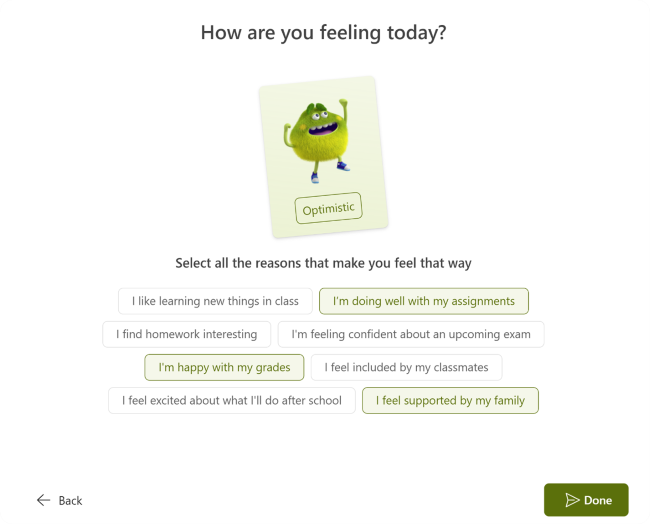
Reflect is built to not just monitor student emotions, but to support educator practices by helping them be reflective themselves.
Social awareness
Social awareness is largely about empathy. The ability to understand social norms (including unjust ones), showing concern for the feelings of others, and recognizing strengths in others are just a few examples of social awareness.
Reflect can support students' development of social awareness in a number of ways. If you choose to allow students to view the distribution of responses to any Reflect question, that can be an excellent conversation starter about how some people are having similar, and some very different, emotions. Explicit instruction can help students develop empathy for one another and manage their relationships more effectively.
The custom question How are you feeling about the mood in our classroom? can help you to initiate conversations after a tough day, or to assess the social awareness of students in your class.
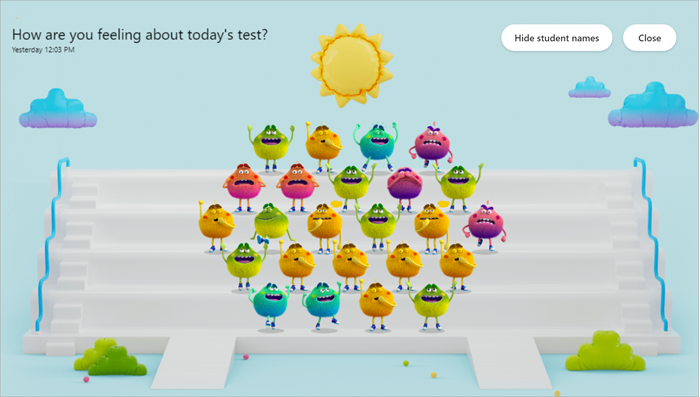
Relationship skills
Communication, collaboration, and conflict resolution are relationship skills that have an enormous impact on future success. Relationship skills are how we navigate the world, build communities of support, and navigate demands and opportunities. Employers indicate that relationship and self-management skills are more important than academics in prospective employees.
Asking students about their friendships can provide insights to the learning your class needs to build communication and listening skills. Teaching vocabulary for students to accurately identify and share their feelings builds scaffolding for each CASEL core competency area, and specifically supports relationships skills by empowering students to articulate their emotions precisely and be understood.
Responsible decision-making
As educators, we want each of our students to find success. Developing an understanding of benefits and consequences, both for themselves and their community, is core to their academic, social, and personal wellbeing. Responsible decision-making requires students to make judgments based on a variety of sources, anticipate consequences, and identify solutions.
Responding to questions about their learning can help make the concept of responsible decision-making concrete for students. Educators can use questions like How do you feel about your progress in this class? to initiate conversations about each student's role in their success, demonstrate open-mindedness, and co-create solutions.
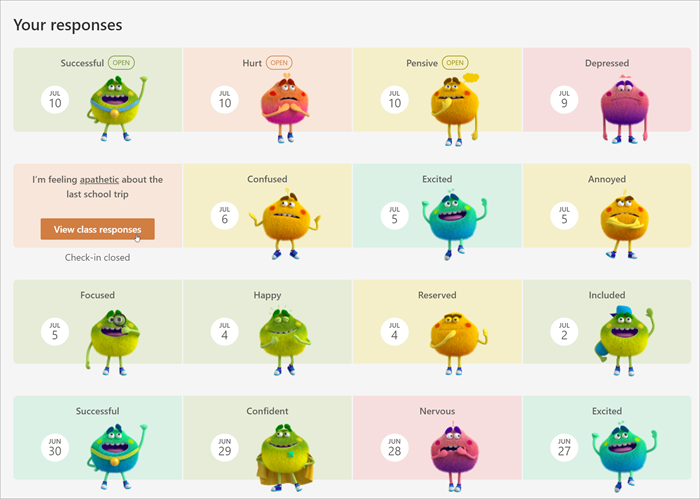
Self-assessment for learning
By providing opportunities for students to reflect on their learning, educators not only inform the trajectory of their teaching, but also increase students’ agency in learning. Students practice asking for help and develop a growth mindset through honestly evaluating their effort, motivation, and progress. It's vital that students have a safe space to develop these skills, as it takes plenty of practice!